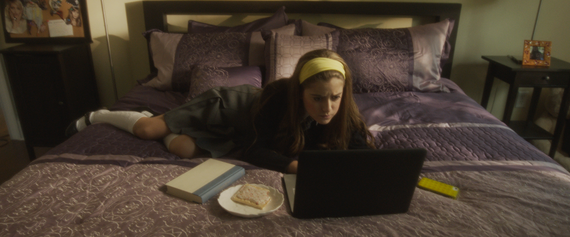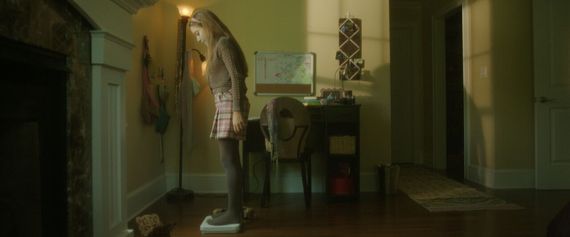Marlee Roberts is an actress and director, known most recently for Little Miss Perfect, a film that tackles eating disorders and the struggle of being a young woman. I had the pleasure of interviewing her about her new film while out in Los Angeles.
Sam: What was the inspiration for choosing eating disorders as the topic of your directorial debut?
Marlee: Great question. Well, the film touches upon eating disorders but also extends to a lot more, I think. It's about an overachieving high school freshman who tries to control her life by controlling her weight, but it also deals with social exclusion, body image, family pressure, and bullying at a time in a young persons life where they feel like things are happening to them and for them instead of by them. I wanted to make Little Miss Perfect connected with this struggle for control over some aspects in my life. I feel myself still struggling with the idea today that my accomplishments don't make up who I am and that it's about your character, not your achievements that create a sense of self worth. So that's why personally it meant a lot to me. And then focusing on the psychology of eating disorders, which hasn't really been done, and nobody has really been talking about that. It's been a subplot in some movies, and it has been in the foreground in others, but this tackles the behavioral aspect and psychology hasn't been really touched on. I felt like my need for control was similar to that of girls who struggle with anorexia in particular. In high school I found an online pro-eating disorder blog and discovered that there was this whole community of girls who were feeling the same way that I was. But they were promoting anorexia as a lifestyle choice, encouraging other girls to diet in unhealthy ways and to regain control in this very unhealthy way. So naturally I was curious, and yet I knew what I was seeing was wrong. So this film really tries to put that into context for other people.
Sam: Often actors in Hollywood move onto directing at some point in there career. Has any aspect of directing come more easily or perhaps more difficultly due to your past experience as an actor?
Marlee: I think that my entire experience being a child actor has one hundred percent informed everything that I know as a director. And coupled with my knowledge from film school, I really felt comfortable. Directing has been a really great place for me, and I've found that directing is really where I'm taking my career now. I love working with actors, and being on the other side of it, I try to always remember what I felt like and what helped me the most, and I know that everyone has their process, so I really allow for that. So it has helped me tremendously.
Sam: What is your overall goal for the film as a vehicle for getting across your message? What do you hope for people to be thinking when they leave the theater?
Marlee: We've already had a few screenings. We had one at Irvine in California and we had one that just finished up in New York. What amazed me and was most fulfilling was actually hearing what people were saying as they were leaving the theater. Their feedback when they came up do me was discussing the themes and how it connected to them. And what I found was it wasn't just teens that connected with the film, and I actually had some grown, older gentlemen come up to me in tears. I don't know whether they went through it with their children or if they were just brought back to a place, but what I realized was that it does open up a larger mental health discussion. And that is something that we really want to have with this movie, a proper discussion and an open awareness that everyone is dealing with something. People always sweep it under the rug and try to pretend they're okay, and that's why the film title reflects a sort of positive exterior while underneath things are clearly negative. So we are trying to get it out to college campuses, middle and high schools, rehab centers, anywhere that we can screen the film for educational and hopefully beneficial purposes.
Sam: As a professional working in Hollywood, what do you think of the typical Hollywood image of beauty? What do you think of the media's responsibility to convey positive body image?
Marlee: That's a really great question. The media has such an impact on society as a whole, so whatever we're putting onscreen and whatever we are sharing will effect and trickle down into society and what society aims to emulate. So it is definitely important that whatever we put out there is taken seriously because there are repercussions. With that being said, I think that things are changing with a lot more diversity in body image, and embracing the variety of body types. I think that is definitely of the rise and changing for the better. While the media alone can't cause someone to have an eating disorder, it can be a severe trigger. Media is so at our fingertips, and we are constantly choosing what we watch, which are the things that can influence us the most.
Sam: If someone wants to see Little Miss Perfect, how can they do so?
Marlee: We have a few screenings coming up, as well as a few schools to showcase the film. We are also talking with a couple of distributors, so we will be able to announce that shortly!
Here is the official Little Miss Perfect trailer:


